About Us
Advanced Roofing Technologies, your dependable partner for durable, efficient, and affordable flat roofing solutions. Protecting your home, one roof at a time.
Instant Quote Instant QuoteContact Info
- 950 W Venango Street
Philadelphia PA 19140 - 267-277-2124
- [email protected]
- Week Days: 09.00 to 18.00
Sunday: Closed
Commercial Flat Roofing
- Applications
- Commercial Flat Roofing
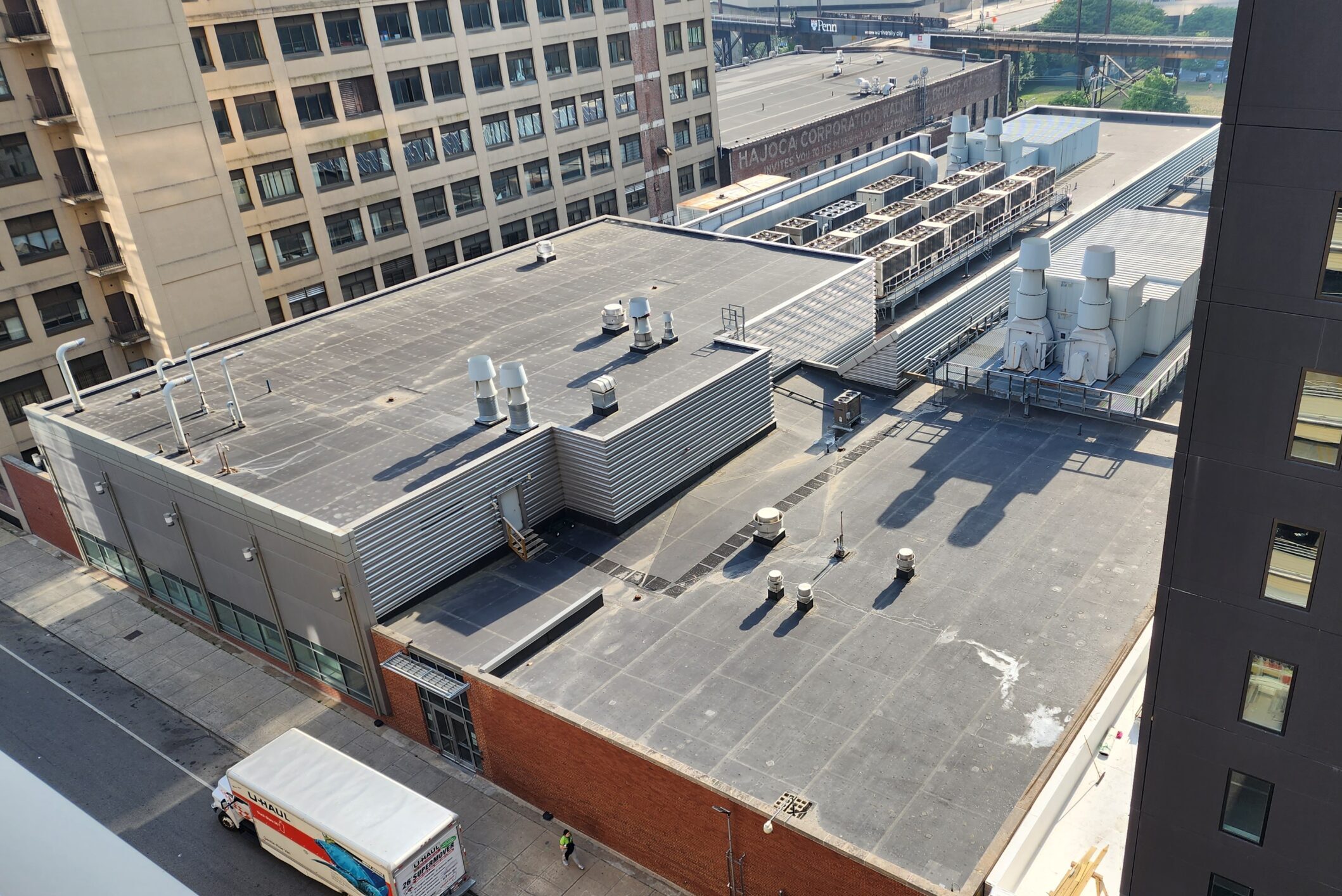
Commercial flat roofs are typically seen on businesses, warehouses, and larger buildings such as schools or hospitals. They are engineered to handle substantial weight, accommodating heavy HVAC systems, vents, and sometimes even helipads.
Commercial roofs also often feature more robust waterproofing systems to manage the larger surface area. Moreover, commercial flat roofs need to comply with more stringent building codes and fire safety regulations due to the higher occupancy levels.
While commercial and residential flat roofs may appear similar at first glance, there are significant differences in terms of their construction, materials, maintenance requirements, and installation processes. Understanding these differences is crucial for both property owners and roofing professionals to ensure the right choice for each specific application.
Differences Between Residential Flat Roofs and Commercial Flat Roofs
The type and design of the roof play pivotal roles in both aesthetic and practical terms, directly impacting the building's function and longevity. This is particularly true when comparing commercial and residential flat roofs, which, while similar in some respects, have many differences that are worth exploring.
Residential flat roofs are predominantly installed on homes, apartments, and smaller residential structures. They are typically smaller, with less emphasis on weight load since they rarely need to support heavy equipment. The waterproofing requirements, while still critical, are less intense due to the smaller surface area. Aesthetics also play a more prominent role in residential flat roofs, with a wider variety of materials used to match the home's style.
Who Needs Commercial Flat Roofing Services?
Commercial flat roofs are a key requirement for businesses, industries, property developers, and facilities managers. They're integral to the functionality and safety of commercial buildings such as warehouses, offices, schools, hospitals, and multi-unit residential properties. At Advanced Roofing Technologies, we partner with these stakeholders who need reliable, durable, and cost-effective roofing solutions tailored to their unique operational demands.

Commercial Property Owners
Commercial Property Owners
Individuals or corporations owning commercial spaces such as retail stores, office buildings, warehouses, restaurants, etc., often require commercial flat roof installation, routine maintenance, or repairs on their properties. The scope of their requirements may include choosing appropriate roofing materials, following proper installation methods, ensuring regular maintenance schedules, addressing minor repair needs promptly, and implementing a comprehensive roof replacement plan if necessary.

Commercial Property Managers
Commercial Property Managers
Tasked with the care and maintenance of commercial properties, property managers frequently require commercial flat roof services, including regular inspections, preventive maintenance, and quick, efficient repairs. These services help maintain the integrity of the roofs, contributing to a safe environment and the overall aesthetic appeal of the properties they oversee.

Commercial Property Developers
Commercial Developers
These groups undertake construction projects on a large scale, including building new structures or renovating existing ones. They need comprehensive commercial flat roof services, such as consultation on suitable roofing systems, professional installation following building codes and architectural plans, and using appropriate materials considering weather conditions and usage. Their collaboration with commercial flat roof services ensures the final built environment's quality, safety, and longevity.
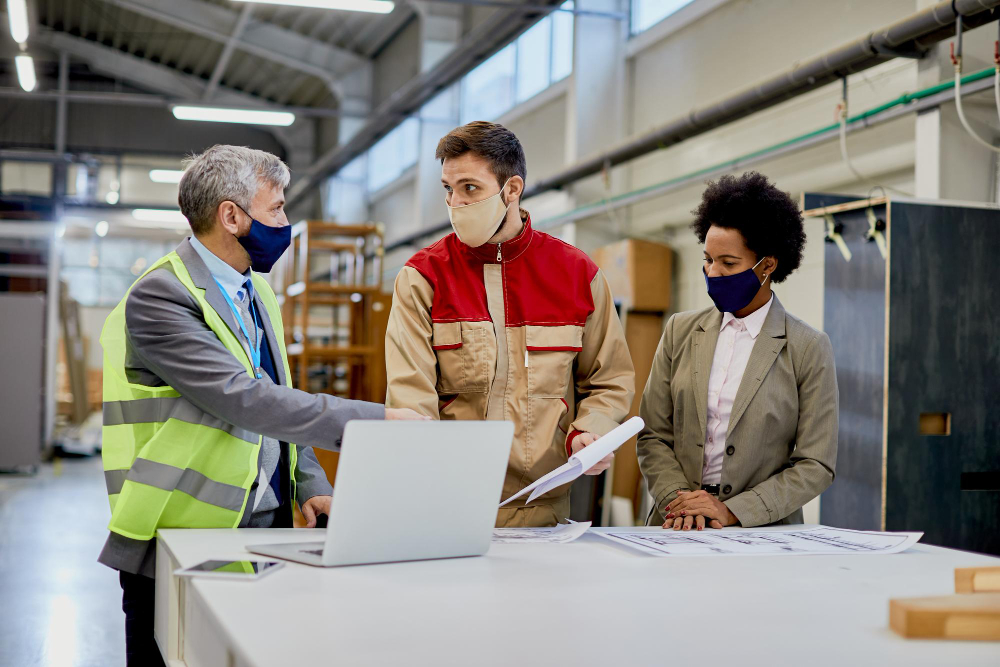
Facility Managers
Facility Managers
Overseeing the maintenance and operation of commercial buildings, facility managers need commercial flat roofing services for periodic inspections, routine maintenance, timely repairs, and replacements when required. The aim is to maintain the building's overall structural integrity, minimize operational downtime, and ensure safety, requiring services that are prompt, reliable, and of high quality.

Government and Institutions
Government and Institutions
Public sector organizations, like government buildings, often require specialized commercial flat roofing services. This can include professional installation, regular maintenance, and prompt repairs, all adhering to specific regulatory and industry standards. The services need to deliver durable, long-lasting solutions that support their commitment to public service.
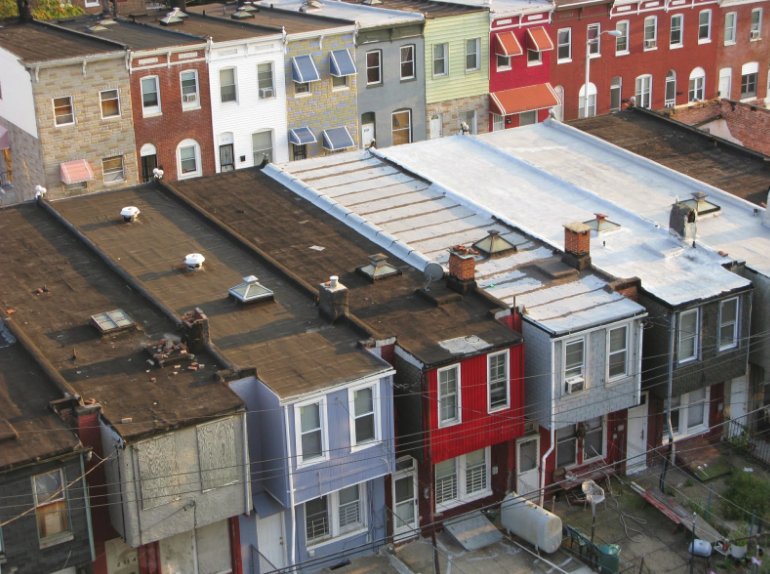
School and Universities
School and Universities
Schools and universities, as parts of public sector organizations, often feature flat roofs due to their cost-effectiveness, efficient use of space, and flexibility for architectural design. The roofing needs for these institutions can range from initial installations on new structures to regular maintenance and timely repairs.
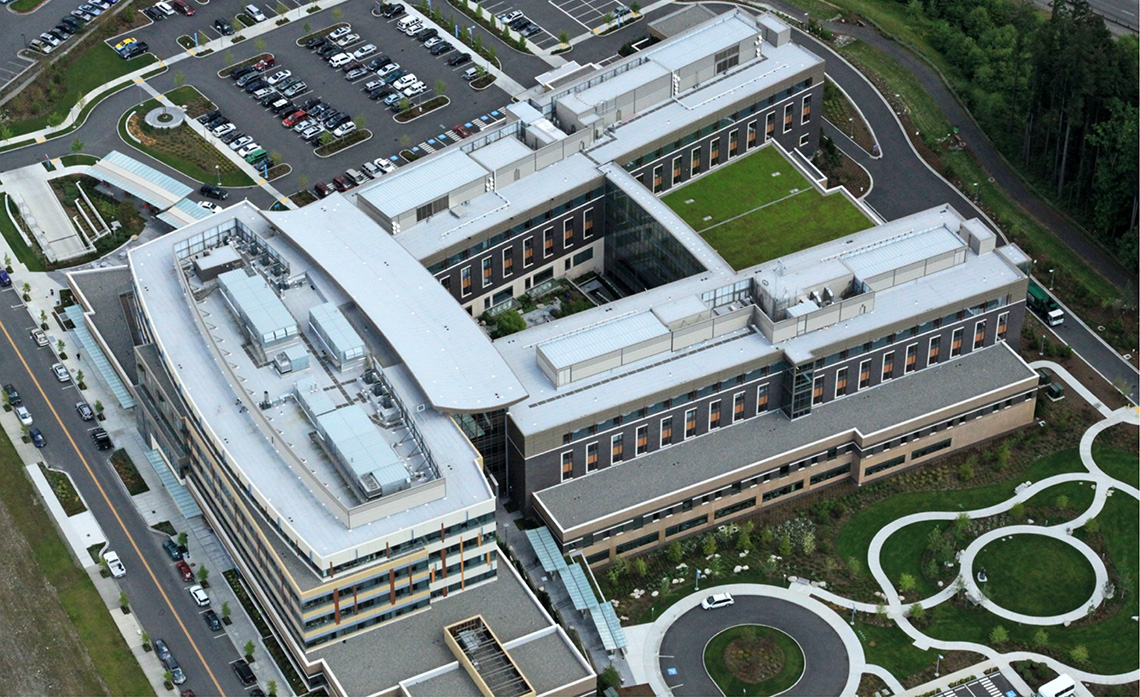
Healthcare Facilities and Hospitals
Healthcare Facilities and Hospitals
Healthcare facilities and hospitals have unique needs when it comes to their roofing systems. These facilities require commercial flat roofs that are reliable, durable, and require minimal maintenance. Healthcare Facility Managers require services for regular roof inspections, preventive maintenance, and repairs or replacements when needed. They need to ensure the roofs' integrity to maintain a safe, hygienic, and comfortable environment for patients and staff.
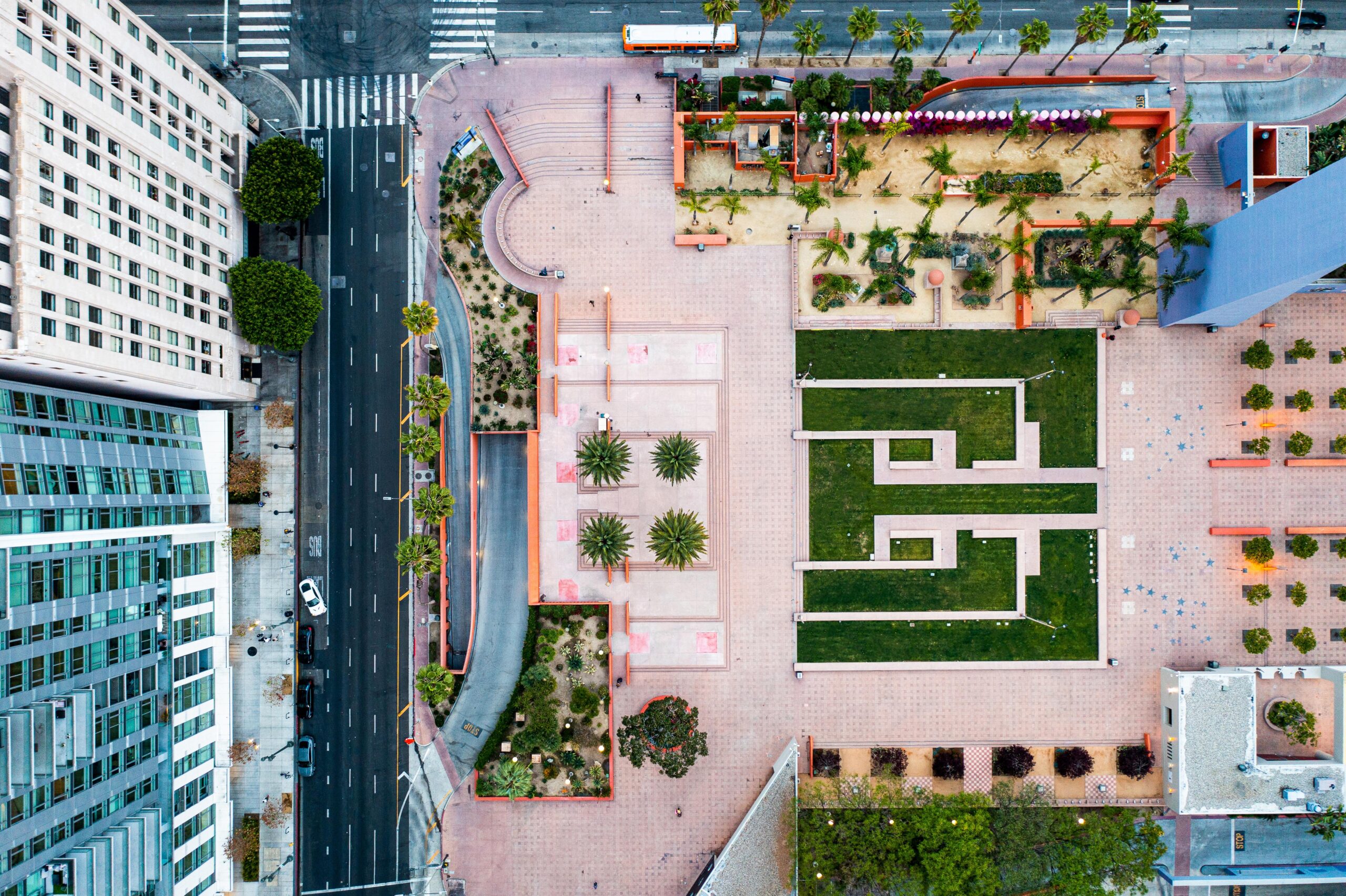
Hotels
Hotels
Hotels need robust and durable roofing systems that contribute to the property's overall aesthetic appeal while providing safety and reliability. The flat roofing needs for hotels may range from initial installations on new constructions to routine maintenance and repairs on existing roofs. Hotel owners and managers ensures the roof's integrity for the safety of their guests and staff, preventing potential damage, and enhancing the hotel's overall aesthetic and property value.
What Services Should Commercial Flat Roof Owners Expect?
While commercial flat roofing involves substantial investment, selecting the right materials and services (repair, replacement, installation, maintenance, and inspection) ensures minimal downtime, operational continuity, and an increase in the property's value. The ultimate goal is to provide a safe and efficient roofing system that meets the demands of commercial operations.
» Commercial Flat Roof Repair
Repairing commercial flat roofs is a complex task requiring professional expertise. From addressing leaks and water damage to fixing structural issues, the right materials and strategies are paramount. For instance, using high-quality, durable materials can extend the roof's lifespan and prevent frequent repairs, saving businesses money and time in the long run. It's crucial to schedule repairs during periods of minimal operation to avoid disruption and maintain business continuity.
» Commercial Flat Roof Replacement
Over time, even the best-maintained commercial roofs will require replacement. This process involves significant investment, but choosing the right materials can yield long-term benefits in durability, energy efficiency, and reduced maintenance costs. Timing is essential during roof replacement, as it should be planned when it will cause the least operational disruption. A well-executed roof replacement can increase a property's value, making it a worthwhile investment.
» Commercial Flat Roof Installation
Installing a new commercial flat roof is a considerable undertaking that requires expert knowledge. The material choice greatly influences the roof's durability, maintenance needs, and energy efficiency. The installation process for commercial flat roofs is often more complex and time-consuming, given the larger surface area and additional features.
» Commercial Flat Roof Maintenance
Commercial flat roofs typically have longer lifespans due to the heavier-duty materials used. However, they require more regular and rigorous maintenance due to their size and the amount of equipment they bear. Regular maintenance is essential for extending the lifespan of a commercial flat roof and preventing significant damage that can lead to costly repairs or replacements. Routine maintenance tasks may include clearing debris, inspecting for and repairing minor damages, and checking the drainage system. A well-maintained roof ensures the building's integrity, provides energy efficiency, and prevents operational interruptions.
» Commercial Flat Roof Inspection
Regular inspections are vital in detecting potential issues early. Trained professionals can identify minor problems that, if left unattended, could develop into significant issues requiring substantial investment to fix. These inspections should be part of a regular maintenance plan, ensuring that the roof remains in good condition and contributes positively to the building's overall value and functionality.
Tips to Hire The Best Commercial Flat Roofing Contractor
Commercial flat roofs are a crucial structural element of many business premises, playing a vital role in maintaining the safety and integrity of the buildings they protect. However, these roofs often face unique challenges, including leaks, the need for suitable materials and insulation, and specific requirements for coatings and waterproofing.
Commercial Flat Roof Leaks
Commercial flat roofs are susceptible to leakages due to their minimal slope, which can impede proper water drainage. Leaks can lead to significant water damage, impact operations, and require substantial investment to repair. Routine inspections and prompt attention to potential leak points, such as roof seams and flashing around roof penetrations, are crucial for minimizing leak-related issues.
Commercial Flat Roof Materials
The choice of material for a commercial flat roof significantly affects its durability, maintenance needs, and overall performance. Popular materials include Ethylene Propylene Diene Monomer (EPDM), Thermoplastic Olefin (TPO), and Polyvinyl Chloride (PVC), each with its unique advantages. For instance, TPO is known for its energy efficiency and durability, while EPDM is popular for its long lifespan and resistance to weather conditions.
Commercial Flat Roof Insulation
Proper insulation is crucial for maintaining the internal temperature of commercial buildings, enhancing energy efficiency, and reducing utility costs. Rigid foam boards, spray polyurethane foam, and cover boards are popular choices for insulation. Moreover, insulation can also help reduce noise and provide an extra layer of protection against leaks.
Commercial Flat Roof Coatings
Roof coatings serve several purposes, including reflecting solar heat, preventing leaks, and extending the roof's lifespan. They are often applied to aging roofs as a cost-effective alternative to full roof replacement. Silicone, acrylic, and polyurethane are popular choices, with each offering specific benefits. For example, silicone coatings are excellent for waterproofing, while acrylic coatings provide superior UV resistance.
Commercial Flat Roof Waterproofing
Waterproofing a commercial flat roof is crucial to prevent water intrusion, structural damage, and the growth of mold. Various methods can be employed, such as the application of waterproofing membranes (e.g., TPO, EPDM), liquid waterproofing, or bituminous coatings. Regular inspections and maintenance ensure the continued effectiveness of the waterproofing system.
High Performance Liquid Membrane For Commercial Flat Roofs: LOTUS B2 Base Coat
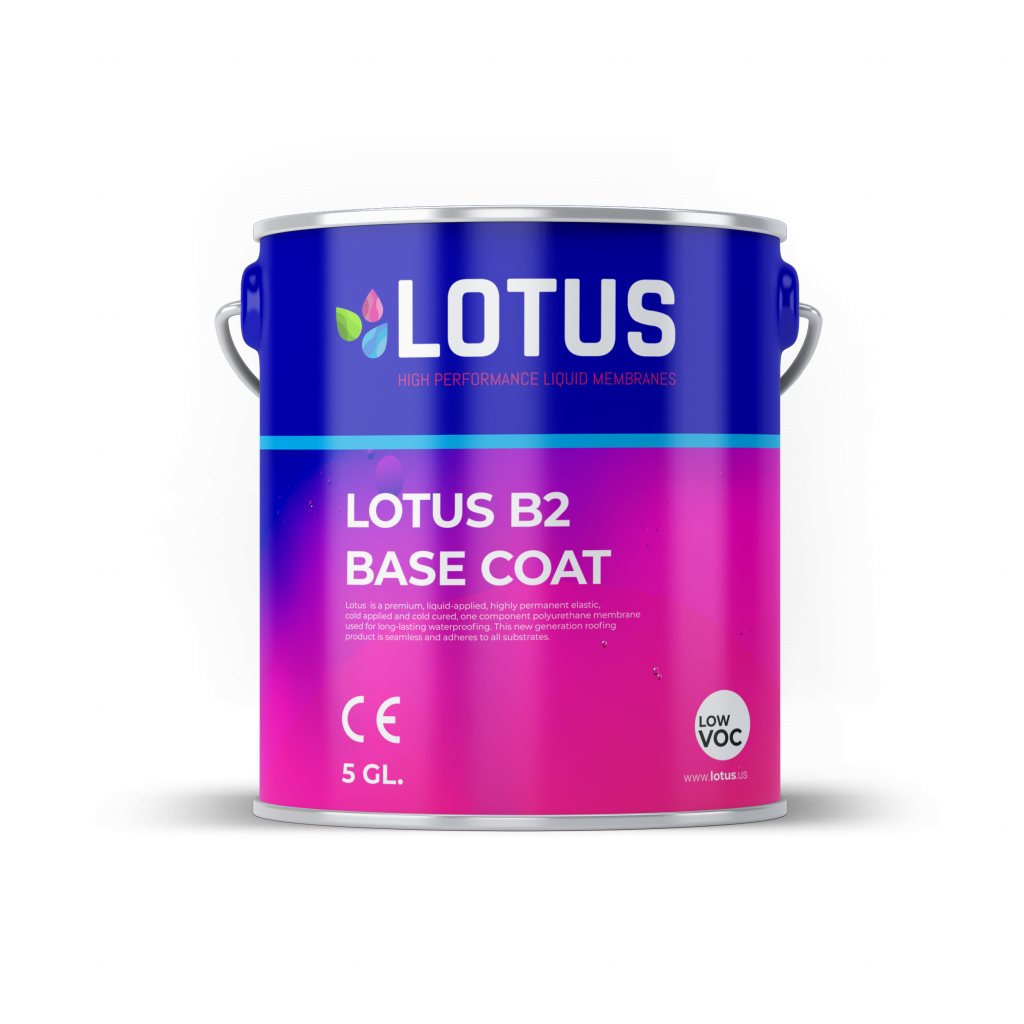
Choosing the best material for commercial flat roofing entails careful consideration of durability, resistance to the elements, and long-term performance. A product that thoroughly addresses these needs is the LOTUS B2 Base Coat.
LOTUS B2 Base Coat is a top-tier, single-component membrane, cold-applied, and crafted as a liquid. This product is designed with enduring waterproofing in mind, making it a superior choice for commercial flat roofing. A distinctive feature of this product is its seamless membrane devoid of joints, offering uniform and secure coverage that significantly extends the life of a flat roof.
Featuring high resistance to both water and frost, the LOTUS B2 Base Coat also boasts exceptional resistance to weather and UV rays. These properties are due to the product's foundation on pure elastomeric hydrophobic resins, endowing it with superior mechanical, chemical, thermal, UV, and natural element resistance properties.
Where Can you Use LOTUS B2 Base Coat
LOTUS B2 Base Coat is crafted from pure elastomeric hydrophobic resins, which yield exceptional mechanical, chemical, thermal, UV, and natural element resistance properties. It cures through reactions with ground and air moisture. Suitable for the waterproofing of commercial roofs, rooftop decks, garages and mechanical rooms, balconies and terraces, wet areas (bathrooms, kitchens in commercial buildings), traffic decks, green roofs, and concrete structures.
Advanced Roofing Technologies: Your Trusted Commercial Flat Roofing Contractor
Advanced Roofing Technologies is your trusted commercial flat roofing contractor for all your commercial flat roof needs when you are looking for a prompt and reliable commercial flat roof repair, replacement, or installment services.
Our experienced team provides professional and comprehensive commercial flat roof services, addressing leaks, cracks, and other damage swiftly and effectively. We offer high-quality, durable roofing systems that are designed to last, ensuring you get the best return on your investment.
As leading commercial flat roof installer, we understand that every business has unique requirements. Whether it's the choice of commercial flat roof materials or the scheduling of work to minimize disruption, we tailor our services to your needs. We offer high-performance liquid membrane with LOTUS product line, the best commercial flat roofing system and materials on the market. Durable, energy-efficient, and aesthetically pleasing, our roofing solutions cater to diverse commercial needs.
At Advanced Roofing Technologies, we're more than just roofing experts. We're problem-solvers, dedicated to finding the right commercial flat roof solutions for your business.
Contact us today to discover how we can help protect your business, one roof at a time.

